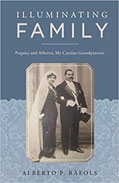
 |
Not many can trace their family back to the late fourteenth century. The Ràfols-Insenser family will fascinate readers as they learn how the family moved from Catalunya, Spain, to Cuba and the United States. The whole family exemplifies talent, tenacity, and a dash of terrestrial restlessness.
The author considers studies on immigrant successes in general. He notes that audacity, a touch of insecurity, and patience are all components of immigrant success stories. This evokes interest about how this applies to all readers' immigrant relatives. Ràfols himself is an immigrant success story, as a world-class pianist with a doctorate in music. But the story gets even richer as he details his roots.
The Spanish and Cuban history in the book is fascinating, too. For example, Ràfols writes of the time his grandfather arrived in Cuba, still under Spanish rule: "...Spanish law provided for an eight-year period of 'tutelage'.... This amounted to continued servitudes, as these "liberated" former slaves were required to spend eight more years working for their former masters without pay." As for the history of Cuba's transformation, American schools vaguely teach about politics, rarely considering personal narratives. In this area, this book is extra rich. For instance, regarding the rise of Castro, Ràfols says, "From that moment on, leaving the island would become an obsession for most middle and upper classes."
Since society is now so electronic in its communications, one is likely to be moved to tears by the letters the author's grandmother writes to her grandsons. This family history is indeed illuminating. The author's writing is fluid and entertaining, and he certainly has numerous remarkable stories to tell.